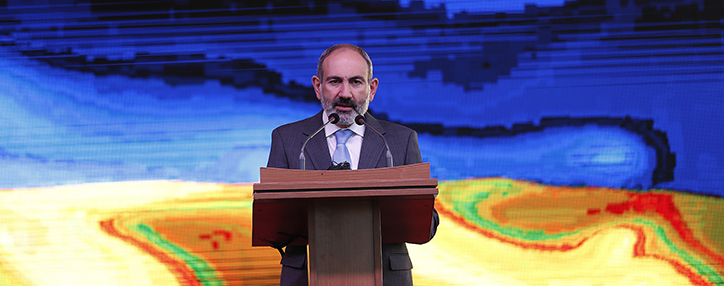Pashinyan says Armenia needs new constitution

YEREVAN, July 6. /ARKA/. On the occasion of Constitution Day, marked on June 5, Armenian Prime Minister Nikol Pashinyan congratulated his fellow citizens, saying in a message that ' it is necessary to honestly state that although we all understand the importance of the Constitution in terms of building state institutions, streamlining public and state relations, this holiday implies some half-heartedness and raises specific misgivings.]
Pashinyan's message reads as follows: 'Three times in the history of the Third Republic of Armenia our people adopted a new Constitution or constitutional amendments by referendum. However, the results of none of those referendums were considered trustworthy by society. The citizens of Armenia did not consider the decisions on adopting or amending the Constitution, nor did they consider the Constitutions so adopted as their own.
This is the biggest systemic flaw in our state structure, because the Constitution should be an agreement of citizens on citizen to citizen and state-citizen relations. Consequently, the state system should be supported by the collective will of all citizens, which should become a factor guaranteeing the inviolability of statehood, evidence of citizens’ responsibility for the fate of the state, and an expression of citizens’ will to have a state.
The analysis of a number of events, especially in the recent period, has led me to the conclusion that the citizens of Armenia often do not consider the country’s state system as their property, do not see an organic connection of this system with their will. Although my position was that frequent changes to the Constitution subject the state system to inappropriate stress, constant changes to the Constitution lead to uncertainty, the realization of the circumstances mentioned in the previous paragraph led me to the conclusion that our country needs a new Constitution, which should lead to a political system based on the free-will of our citizens.
Accordingly, the new Constitution should not be conceived to suit the tastes and mores of a particular individual, political force or group, nor to ensure the reproduction of any power, but to address the strategic issue of formulating the citizens’ free-will to have a statehood of their own.
This process has already started, and we hope that the draft Constitution will be put up for the widest possible public debate, and the new Constitution will be adopted through a nationwide referendum in 2021. I wish all of us every success in this important matter.'
The first Constitution of the Republic of Armenia was adopted at the referendum on July 5, 1995. The first attempt to reform it in 2003 failed and after a series of changes two years later, 94.5% of the population voted in favor of the reform.
The amended constitution provided for transfer of part of powers vested in president to other state bodies. The amendments increased also the role of the National Assembly.
On April 9, 2018 Armenia shifted to the parliamentary form of government in line with constitutional changes approved at a national referendum in 2015. According to the changes, the president of Armenia, whose powers are significantly curtailed, is elected for a term of seven years (instead of the previous five) by the parliament. Presidents are limited to one term of office.
According to the constitution, the president of Armenia is e head of state, embodying national unity and ensuring the observance of the Constitution. The president cannot be a member of a political party.
Under the approved changes the president is to appoint a candidate for prime minister from the party or party bloc that wins parliamentary elections. If parliamentary forces are unable to agree on the candidacy of the head of government, parliament is to be dissolved. A vote of no-confidence in the prime minister can be passed no sooner than a year after their appointment. The armed forces are subordinated to the government, and the prime minister is the supreme commander of the armed forces in times of war.
On June 22, Armenia's National Assembly adopted a string of amendments to the Constitution, designed to replace some members of the Constitutional Court. According to the new edition of Article 213 of the Constitution, the powers of the current chairman of the Constitutional Court Hrayr Tovmasyan and those judges who have been in office for a total of more than 12 years are terminated. The remaining judges will continue to work until this deadline. A new head of the Constitutional Court should be elected for a 6-year term after all members of the Court are elected.
Thus, with the new amendments, the powers of the members of the Constitutional Court are terminated, except for those who were elected after 2015. There are two such judges - Vahe Grigoryan and Arman Dilanyan.
Since the adopted draft relates directly to the Constitutional Court, the ruling My Step parliamentary majority refused to send the amendments to the Constitutional Court on grounds that its judges must not determine the amendments’ conformity with other articles of the constitution because of a conflict of interest.
Armenian President Armen Sarkissian signed into law a package of bills on amending laws on the referendum, on the regulations of the National Assembly and on the Constitutional Court .-- 0--



